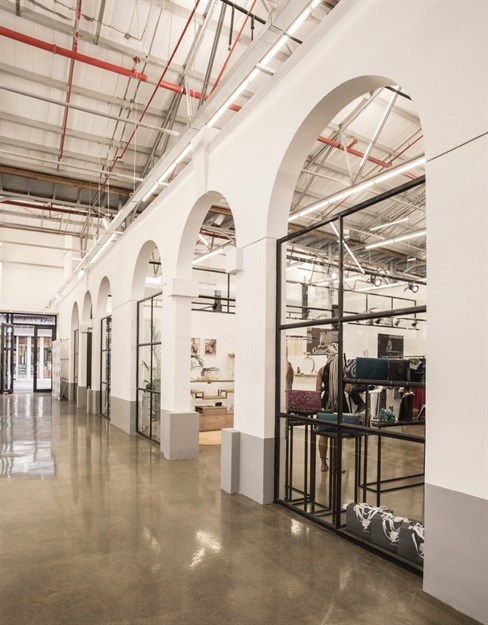
Top stories






LifestyleWhen to stop Googling and call the vet: Expert advice on pet allergies from dotsure.co.za
dotsure.co.za 2 days
More news

















Here's why. She explains what makes WSNT a unique platform for local designers to showcase and sell their product, how Joburgers’ shopping behaviour differs from that of Capetonians, and why bricks and mortar is still so “much better than e-commerce”...
We [Trevyn and her husband Julian] were introduced to Atterbury Property Developers by Maira Koutsoudakis of Life. Maira was going to be opening The Potato Shed and Gentlemen’s Arthouse at Newtown Junction, a pedestrianised precinct that Atterbury was developing. She knew they were looking for something different from the mall environment already present in the precinct, and had seen what we’d done at Watershed, and so she linked us up. Atterbury wanted to create a retail space that was unconventional, and so we were brought in to curate, design and run it.
They’re similar in the way that they are both strong platforms for local design, with interactive events, such as markets and exhibitions. Work Shop New Town differs in the way that its primary focus is fashion. Also, that it’s very much focused on a Joburg audience, with an urban, historic and cultural representation. The individual retail spaces in Work Shop New Town are larger, and there’s a big focus on collaboration, exchange and interaction between the brands, with the aim of it being a hub of creativity.
Joburgers are much more decisive than the Cape Town buyers. In Joburg, if people like something, they buy it - there’s less to-and-fro’ing to make a decision. Also, because expendable income is higher in Joburg, there’s a bigger market of potential customers. Joburgers also have a strong identity of being African - they’re not driven by trends and fads, but have rather created their own very strong sense of identity. Because of the bigger geographic distances in the region, Joburgers are always travelling to get somewhere, so they are exposed to so much more - more time seeing billboards, more time listening to the radio… So they’re quite an informed market.

My husband and business partner, Julian, together with Adri van Zyl of Atelier Interiors, created the interiors to reflect the rich cultural and commercial heritage of Newtown. Working with a heritage building, with a roof that could not be changed in any way, meant that they had to think creatively about how to contemporise an old, disjointed building into one big open-plan space that still allowed for specific pockets of interest. The way the roof structure has been turned into a strong aesthetic aspect within the interiors adds to the visual language. This includes incredible steel structures that Julian and Adri created to link Work Shop New Town to Joburg’s gold-mining legacy, alluding to the history of the now-modern space.
It was an obvious move for the retailers who had not yet had a store in Joburg, and had only ever sold in Cape Town. Rental is much more affordable than in your traditional mall, and it made sense for these designers and retailers to be in a space shared with other local brands. It’s a great way to break into the Joburg market. For those previously only based online, such as Kisua and MaXhosa by Laduma, this permanent physical presence is an important step in their brand identity. This collective of brands solidifies the importance of celebrating what Africa has to offer right now. It also encourages more collaboration with brands stationed so close to one another, and the exchange of dialogue is sure to stimulate this industry’s growth.
We want people to touch, smell, taste, try on and really experience each brand. There’s nothing like a good dose of local shopping, and the internet just doesn’t offer the same satisfaction. We want people who visit Work Shop New Town to spend a whole day with us - dining at either The Potato Shed or Town, the new Asian-inspired eatery that will open in our space in March, shopping some more, checking out the exhibitions in our venue, enjoying a drink at Maira’s Gentlemen’s Arthouse, also opening next month, and watching a show at our neighbour, The Market Theatre. Much better than e-commerce!
Definitely. I think Durban has a lot to offer, with many creatives doing incredible things there, and a lot of visitors gravitating there as our winters become colder in other regions. Even small towns and padtalletjies are picking up on this SA-design focus, with many small spaces opening up to sell locally produced products. South Africans are more aware of the talent evident in this country now, and are quicker to support this with their wallets.
Newtown will be introduced to the First Thursdays line-up next month, which is a fun way for people to experience the precinct in which we’re housed. Also starting next month, we’ll be holding weekly urban picnics called Pic Nic New Town, every Saturday on the green mile outside our back entrance. This is going to be wonderful way to enjoy family time, with live entertainment, children’s activities and incredible picnic offerings. It’s sure to become a must-do weekend event on social calendars.
